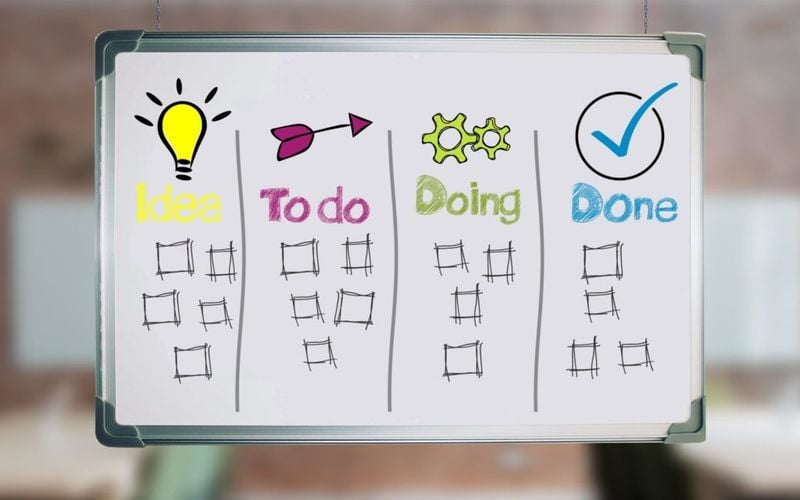Agile Project Manager Career Guide
Whether you’re thinking of becoming a project manager or transitioning into an agile environment, I think a little context is needed. The agile methodology appeared in the 1990s as an alternative to the traditional or waterfall method for software development. It was designed to be a collaborative process with short development cycles that incorporated user feedback. The objective was to create a management method that was more flexible and offered continuous improvement. In 2001, the Agile Alliance created the Manifesto for Agile Software Development, which became the foundation of agile project management.

Read the Manifesto if you haven’t. It contains four values and 12 principles that define what an agile methodology is. The document explains the what, but not the how, of agile management. That’s what methods such as SCRUM, Kanban, or Extreme Programming do. They each have unique ways of implementing agile values and principles. To avoid unpleasant outcomes, be sure you understand what employers want when they ask for an agile product manager.
What Does an Agile Project Manager Do?
What an agile project manager does depends on which of the agile frameworks is being used. For example, SCRUM doesn’t use project managers. Instead, it has a Product Owner and a ScrumMaster. The ScrumMaster does not assign tasks or provide day-to-day instructions. They are responsible for communication, time management and risk assessments. Product Owners represent customers and stakeholders and are more concerned with project costs, procurement and resource allocation. The remaining traditional management tasks become part of the team’s responsibility.
So what does an agile project manager do if agile management doesn’t use project managers? No matter what they are called, every project has someone who is responsible for:
- Project Planning and Management. Define project scope and schedule. Communicate with team members through meetings or reports.
- Team Management. Develop team members but hold them accountable. Remove obstacles and leverage resources.
- Product Owner Support. Manage customer expectations and maintain communications with stakeholders.
- Process Management and Improvement. Define and manage a well-defined process that incorporates Agile values and principles.
- Team Building. Ensure team members are fully engaged and making meaningful contributions to the quality of the product.
Agile project managers are the gatekeepers of the four Manifesto values. It’s their responsibility to see that the project complies with agile standards.
What Skills Do Agile Project Managers Need?
More than technical skills, agile project managers need soft skills that allow them to encourage and motivate team members. Here are some of the more essential skills:
- Excellent communication and collaboration skills
- Critical thinking and problem-solving abilities
- Flexible and adaptable
- Focused and organized
- Strong coaching and mentoring skills
- Ability to make decisions in changing environment
Learning to be an agile project manager comes from on-the-job training more than formal education. Find every opportunity to be part of a project team. Even if you are only observing, the more familiar you become with how agile methods are implemented, the more credible you will be.
Several organizations offer certifications such as:
- Associate or Master’s in Agile
- Agile Certified Practitioner (ACP)
- Agile Project Management Practitioner (AgilePM)
The following organizations also offer certification programs.
I recommend getting as many certifications as possible. Listing certifications is an easy way to establish credibility.
What is the Typical Salary for an Agile Project Manager?
Unfortunately, salary data for agile project managers is not reported separately. For now, it is part of the general project manager data. According to Indeed, the average project manager’s salary is about $85,000 per year. There isn’t much variation in compensation for individuals with less than ten years of experience. A project manager with ten years of experience averages about $90,000.00 per year.
For senior project managers, the average annual salary is close to $118,000. Positions in California and Iowa tend to pay 20% to 30% more than the average. Although some wages are as high as $200,000, they can also be as low as $90,000.
Project management careers are expected to grow in the next ten years. In fact, a skills gap is expected as existing project managers begin to retire with no trained replacements. This gap is across all business sectors. For example, healthcare in the United States is projected to see an increase in project manager positions of 17%.
How to Find an Agile Project Manager Position?
Everyone struggles with writing a resume. It is especially challenging when you have years of experience. How do you condense your work life into a page? Here are a few tips.
After your contact information, summarize your strength is three to five sentences, being sure to use keywords. Keywords can be found in the job posting. Don’t slack on including keywords. Many resumes are scanned for keywords. If you don’t have them, your resume will end up in the recycle pile.
Rather than organize your work experience by date, organize by project. Highlighting projects lets, you mention teamwork and agile-specific processes. When it comes to listing skills, try to limit them to five. Seven should be the maximum number.
Remember to customize your resume for each application; otherwise, you may not hit all the keywords. Plus, a customized resume shows a commitment to detail.
Interview Questions
Now that your resume has moved you to the interview round, take some time to work on speaking. Since a percentage of interviews are by phone or video, you should practice speaking, so you know how you sound. Then work on finding answers to the following interview questions.
- What’s the difference between Agile and Waterfall management?
- What is SCRUM?
- Are Agile and SCRUM the same?
- What agile frameworks are you familiar with?
- How long was your longest sprint?
- Have you used Waterfall management?
- What reports do you use?
- What type of testing and test tools have you used?
- Explain Agile.
- How would you measure a project’s progress?
Be prepared to answer very specific questions about agile methodology and associated frameworks. Employers need to feel that you understand the agile mindset. It may feel like a quiz at times, but finding the right project manager is crucial to a company’s success.
A Word of Caution
If you are lucky enough to be hired by a business that has implemented agile management, take advantage of every opportunity. Although agile methods have been a part of software development for a while, not every industry has embraced it. For most organizations, agile methods are new.
If you are transitioning to an agile environment, I don’t have to tell you how disruptive the change can be. You may want to look at some hybrid implementations that may let you ease into agile project management.
If you are new to project management or new to a company, assess where the organization is in their move to agile management. Listen to team member comments about past projects to identify what the obstacles were. Once you know the pressure points, you can find ways to neutralize or work around the obstacles.
Don’t take resistance personally. People do not like change, and moving from a waterfall to an agile management environment is a fundamental change not only in how people do things but also in how they think about them. The upside to the disruption is you are changing the world. What could be more exciting?





